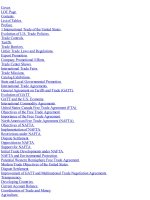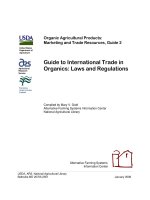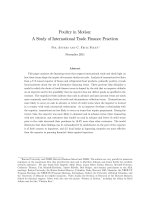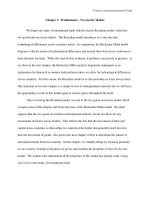Finance of international trade
Bạn đang xem bản rút gọn của tài liệu. Xem và tải ngay bản đầy đủ của tài liệu tại đây (1.25 MB, 223 trang )
Finance of International Trade
Essential Capital Markets
Books in the series:
Cash Flow Forecasting
Corporate Valuation
Credit Risk Management
Finance of International Trade
Mergers and Acquisitions
Portfolio Management in Practice
Project Finance
Syndicated Lending
Finance of
International Trade
Eric Bishop
AMSTERDAM BOSTON HEIDELBERG LONDON NEW YORK OXFORD
PARIS SAN DIEGO SAN FRANCISCO SINGAPORE SYDNEY TOKYO
Elsevier Butterworth-Heinemann
Linacre House, Jordan Hill, Oxford OX2 8DP
200 Wheeler Road, Burlington, MA 01803
First published 2004
Copyright © Intellexis plc (2001), Elsevier Ltd (2004). All rights reserved
No part of this publication may be reproduced in any material form (including
photocopying or storing in any medium by electronic means and whether
or not transiently or incidentally to some other use of this publication) without
the written permission of the copyright holder except in accordance with the
provisions of the Copyright, Designs and Patents Act 1988 or under the terms of
a licence issued by the Copyright Licensing Agency Ltd, 90 Tottenham Court Road,
London, England W1T 4LP. Applications for the copyright holder’s written
permission to reproduce any part of this publication should be addressed
to the publisher.
Permissions may be sought directly from Elsevier’s Science and
Technology Rights Department in Oxford, UK: phone: (+44) (0) 1865 843830;
fax: (+44) (0) 1865 853333; e-mail: You may also
complete your request on-line via the Elsevier Science homepage
(www.elsevier.com), by selecting ‘Customer Support’ and then ‘Obtaining
Permissions’.
British Library Cataloguing in Publication Data
A catalogue record for this book is available from the British Library
ISBN 0 7506 5852 5
For information on all Butterworth-Heinemann publications
visit our website at: www.bh.com
Composition by Genesis Typesetting Limited, Rochester, Kent
Printed and bound in Great Britain
Contents
Preface 9
Chapter 1 Principal players 1
Exporters 1
Importers 1
Freight forwarders 2
Warehousemen 3
Carriers 3
Insurers 4
Banks 5
Factors 6
Government agencies and international
financial institutions 8
Chapter 2 Cross-border trading 10
The risks involved 10
Contracts 13
Methods of payment 17
Chapter 3 Bills for collection 22
Parties to a collection 22
D/P bill for collection (documents against payment) 22
D/A bill for collection (documents against acceptance) 23
Uniform Rules for Collections (Publication No. 522) 30
Contents
Chapter 4 The irrevocable documentary credit 33
Parties to a documentary credit 34
Constructing the credit 37
Issuing the credit 40
Documents required under documentary credits 43
Transport documents 46
Confirmation of a documentary credit 52
Silent confirmation 55
Amendments to the terms of an irrevocable credit 59
Recourse 61
Handling discrepant documents 63
Relevant articles of UCP569 68
Chapter 5 Guarantees 76
Types of guarantee 76
Standby letters of credit 92
International Standby Practices: ISP98 95
Chapter 6 Insurance 100
Short-term export credit insurance 100
Marine insurance 103
Chapter 7 Foreign exchange risk 107
Forward premium and discount 108
Fixed forward exchange contracts 108
Option forward contracts 109
Closing out forward contracts 110
Borrowing in currency 111
Buying currency and holding on deposit 111
Foreign currency options 111
Chapter 8 Special types of credits 113
The revolving credit 113
The instalment credit 116
The red clause credit 116
The green clause credit 118
The advance payment credit 118
vi
Contents
The transferable credit 119
The back-to-back credit 123
The part payment credit 130
Chapter 9 Financing 132
Financing through bills for collection 136
Negotiation of bills for collection 138
Pre-shipment finance 138
Post-shipment finance 140
Assignment/purchase of trade receivables 142
Chapter 10 Forfaiting 144
Countertrade 148
Chapter 11 Electronic commerce for international trade settlement162
Bolero 162
Chapter 12 Prevention of fraud in international trade 166
What measures can be taken to minimize the risk
of fraud? 166
Appendix 1 Trade finance quiz 174
Appendix 2 Guide to exporters and importers 177
Appendix 3 Suggested checklist for beneficiaries when preparing
documents for presentation under a documentary credit 187
Appendix 4 Answers to Case Study 5.8 189
Appendix 5 Answers to Quiz 192
Glossary 195
Bibliography 198
Index 199
vii
This Page Intentionally Left Blank
Preface
Countries world-wide have traded among themselves for over 2000 years
using wide-ranging methods of settlement. Exporters of goods naturally
seek security of payment, whereas importers endeavour to ensure that they
receive precisely those goods they have contracted to buy and for which
they insist on correct documentation for customs clearance purposes.
Raw materials, oil, liquid gas, coal, manufactured goods, soft commodities,
fresh and frozen foods all form just a part of the vast quantities of freight
being carried every day by air, sea, road, rail and inland waterways. To
those must be added the export of technology and industrial and
manufacturing systems for the introduction and modernization of industry
in less-developed and third world countries.
Advances in technology have improved transport by sea and air enabling
carriers to move goods with ever-increasing speed and safety. When an
importer and exporter enter into a contract to buy and sell goods they set
in motion a series of activities involving numerous support services
provided by forwarding agents, road transporters, railway operators,
shipping companies, banks and insurers; each is an important link in the
movement of goods from one country to another. The principal operators
in international trade combine their respective skills to ensure the
successful completion of transactions and the reduction or elimination of
those risks which are ever-present in cross-border trading.
Preface
Depending upon their relationships with one another, some traders may be
prepared to deal on open account where the exporter despatches goods and
documents direct to his buyer and awaits payment in due course. However,
where levels of experience are less well-established, exporters can select a
method of settlement in keeping with their specific requirements.
Most international trade transactions are financed at some point,
principally by banks specializing in this activity, particularly in protecting
against risk during all stages of transport up to final destination.
For the exporter, those risks are non-payment or late payment which both
seriously affect cash flow. The importer, on the other hand, faces the risks
of non-delivery, short delivery and delivery of substandard goods.
In addition, where the importer or buyer is on-selling the relative goods to
a foreign buyer, he runs the risk that incorrect or faulty documents from the
overseas supplier may be rejected at final destination.
Those specializing in finance have devised a range of products and tech-
niques to provide trade operators with varying degrees of protection against
commercial and financial risks and to ensure settlement of contracts.
The bill for collection is by far the most widely used and relatively
inexpensive method of settlement. It involves the exporter in despatching
his goods, raising the documents and handing them, together with a bill of
exchange, to his bank for collection. The documents are then sent to a
foreign bank for payment or acceptance by the buyer.
This method is not without risk, for if the importer fails to pay or accept the
bill of exchange, the exporter’s goods may be left stranded in a foreign port.
Although there are certain facilities available with foreign banks to reduce
the risk of non-payment, exporters who are reluctant to accept the risks
involved in collections will opt to use the safest known method of
settlement in international trade.
Known as the irrevocable documentary credit this instrument is capable of
meeting the most stringent requirements of exporters and importers. It is a
x
Preface
form of conditional guarantee issued by a bank which ensures that the
beneficiary (exporter) will be paid for his goods if he ships them and raises
correct documents. For the buyer (importer) the irrevocable credit provides
a guarantee that the exporter will only be paid when he has actually
despatched the goods and presented correct documents to the negotiating
bank.
Since its inception over 150 years ago, this instrument has undergone
considerable change and adaptation. Available at sight, usance or on a
deferred payment basis, it can be used to meet a whole range of situations
and contractual obligations. We now have revolving, transferable, back-to-
back, red clause, green clause, instalment and part payment credits; they
are all designed to provide the exporter with some degree of pre-shipment
finance and the importer with a level of discipline over shipment schedules
and quality of goods.
Many transactions, although financed by traditional bank instruments and
techniques, require the support of on-demand guarantees and standby
credits. Both are issued by banks to support contracts for the supply and
construction of major civil undertakings, such as airports, highways, bridges
and industrial plant. They can be used in conjunction with documentary
credits as a means of ensuring that exporters adhere to agreed shipment
schedules and quality standards. Each instrument becomes dependent
upon the other.
The issue and operation by banks throughout the world of instruments and
techniques dealt with in this book are subject to a series of publications by
the International Chamber of Commerce, Paris governing practice and
providing operational recommendations.
They are:
Incoterms 2000
Uniform Rules for Collections
Uniform Customs and Practice for Documentary Credits
Uniform Rules for Bank to Bank Reimbursement under Documentary
Credits
xi
Preface
Uniform Rules for On-Demand Guarantees
International Standby Practices.
No trade transaction can be set in motion without some form of marine
insurance to cover the risks inherent in transportation of goods. The
Institute of London Underwriters has drawn up a wide range of clauses
known as Institute Cargo Clauses to cover the movement of most
manufactured goods, plus specific clauses for a variety of raw materials,
frozen foods, commodities and dangerous cargoes.
To protect themselves against default by buyers and against political risks,
such as intervention by foreign central banks to restrict or deny release of
foreign exchange to pay for imports and the imposition of export and
import embargoes, traders are able to take out export credit insurance.
Most of the major trading nations have their own form of export credit
insurance, in many cases with government funding; the incentive to
exporters is obvious. As a consequence of using export credit insurance
exporters are able to obtain finance at preferential rates by assigning their
policies to the banks.
Beyond the traditional day-to-day operations in international trade we find
two rather more complicated and technically sophisticated practices.
Forfaiting is a service offered by specialized operators, designed to
enable exporters of plant, machinery and technology to enter markets
which traditionally require long-term finance. The forfaiter buys from the
exporter a series of bills of exchange or promissory notes, drawn on and
accepted by the overseas buyer and guaranteed by an agreed local bank.
For the exporter this method is particularly advantageous as the forfaiter
discounts the bills completely without recourse. Bills discounted by
forfaiters are traded in a secondary market to provide liquidity for the
practice.
Countertrade is another specialist technique which can be used to assist
countries with little or no foreign exchange to import goods without paying
in currency. The importing countries may produce goods or raw materials
which are not attractive to the overseas seller, but by finding a third country
xii
Preface
prepared to buy those goods or raw materials and pay in currency, the
original exporter can be paid.
Many versions of countertrade have been developed whereby payment for
exports is made by a combination of goods, services, currency and
franchises. Apart from assisting cash-short countries to purchase essential
goods, countertrade also enables exporters to find additional outlets for
their products.
In line with the development of e-commerce a group of banks, carriers and
insurers involved with international trade have developed an electronic
system designed to speed up the movement of documents and methods of
settlement. The system is known as Bolero and its application and
advantages are dealt with in detail. It will have an undoubted impact on
international trade, particularly in the prevention of fraud.
This book examines in depth the whole range of settlement methods for
international trade, the risks involved, the contractual relationships
between the parties and the relevant International Chamber of Commerce
rules.
xiii
This Page Intentionally Left Blank
Chapter 1
Principal players
Exporters
Importers
Freight forwarders
Warehousemen
Carriers
Insurers
Banks
Factors
Government agencies and international financial institutions
Exporters
Exporters are at the beginning of any international trade transaction and
may be manufacturers, traders, farmers or commodity producers. They sell
goods or services to overseas buyers in a variety of ways and, unless they are
part of a large group, will almost certainly require the services of the other
main players. Their aim is to get their goods to buyers around the world in
the quickest and safest manner possible and to be paid in the correct
currency and within their agreed terms of settlement.
The importance of exports to the economies of many countries is
demonstrated by the wide range of support and encouragement given by
governments, particularly through Export Credit Agencies (ECAs). These
agencies offer facilities for promoting exports and allowing exporters to
Finance of International Trade
compete with overseas competitors who often enjoy the advantages of low-
cost labour and raw materials. Multinational groups have spread their
growth into these low-cost areas and their repatriated profits assist in
reducing balance of payment deficits but, clearly, direct exporting has a
greater impact and qualifies for as much assistance as can be afforded.
Countries with large surpluses of natural resources are heavily dependent
upon exports, with the result that they are often obliged to enter into
countertrade schemes with countries lacking foreign exchange, but
requiring essential commodities. Countertrade is a specialized form of
finance designed to facilitate trade between countries unable to earn
foreign exchange to pay for imports and countries needing to find markets
for their products.
Importers
Importers may equally be manufacturers buying raw materials for their
factories, oil companies buying crude oil for refining, or simply merchants
and traders fulfilling contracts with domestic and foreign consumers. For
the latter, import finance is generally critical, often bridging the period
between import and resale. Consequently, merchants and traders rely
heavily on banks and warehousemen to whom they will pledge their goods
before they are re-packed and transported to final buyers. It is important
for them that their overseas suppliers are only paid when the goods ordered
have actually been despatched; this involves the use of payment methods
operated by banks, secured by title to the goods.
Although importers are not looked upon as favourably as exporters in
countries with balance of trade problems, their contribution to the
economy is valuable. Raw materials, foodstuffs, energy and services are
essential to maintain industrial output where there are no natural resources
and the resultant manufactured goods become exchange-earning exports.
Sourcing their raw material requirements involves importers in scouring the
world for quality, price and reliable delivery programmes. The spread of
multinational groups has succeeded to some extent in ensuring supply from
mineral-rich countries in which they have invested for import into other
areas where they have a presence.
2
Principal players
Traders and merchants import goods for resale and for processing before re-
export. They also enter into contracts with foreign suppliers for goods which
are consigned direct to buyers in other foreign countries. This is a highly
skilled activity which demands extensive bridging finance to enable the
operator to buy and sell at the most advantageous prices. Profits from
trading and merchanting are made in foreign exchange and contribute to a
country’s reserves.
Freight forwarders
Freight forwarders, or forwarding agents as they are otherwise known, are
probably the most versatile operators in the trade chain. They collect goods
from exporters, sometimes actually packing them for shipment, transport
them to ports of shipment by road, rail or barge and arrange with the
shipping company (or airline) for them to be loaded on board. Their
knowledge of overseas markets, the documentation required and the
current import regulations applying in foreign countries is of great value to
exporters who will often entrust them with the preparation of certain
documents requiring chamber of commerce certification and consular
legalisation. Of particular importance is the ability of freight forwarders to
issue bills of lading covering goods during transport by several different
means; these are known as multimodal bills of lading. Exporters may
benefit from the freight forwarder combining their goods with those from
other exporters and negotiating with the carrier for a bulk discount on the
freight.
Warehousemen
Warehousemen perform a valuable service prior to the shipment of goods
and after their arrival at the port of destination. As they are always holding
goods belonging to a third party it is essential that they meet stringent
security requirements, the most important of which is that they should be
completely independent. Whenever finance is required for goods which
have to be warehoused at some stage in a transaction, the bank will want
to be certain that the warehouse company is completely trustworthy and
properly managed. It will be expected to issue receipts, known as
3
Finance of International Trade
warehouse warrants, which can be negotiated to a third party when the
person named in them wishes to transfer ownership of the goods. Before
allowing goods to be stored in a particular warehouse, even though the
requirements mentioned above have been satisfied, banks will examine the
warehouse keeper’s current insurance cover and endeavour to have their
financial interest noted on the policy. Of particular value in warehousing
facilities is the function of specialist packing. Warehousemen have an
excellent knowledge of the type of packing required to protect goods during
any form of transportation and to meet specific regulations in force in
foreign countries.
Carriers
Goods may be transported in a number of different ways and by several
types of carriers. We have dealt with freight forwarders who can handle
goods through their journey via different modes of carriage and for which
they issue multimodal transport documents. But there exists a need for
independent road hauliers, barge operators and railway companies to
carry goods on specific routes and to be responsible for the whole journey.
Each provides an excellent service with the advantage that goods are only
loaded and unloaded once. There is widespread use of sealed containers
which are carried by trucks, barges and seagoing vessels, often containing
goods from more than one exporter and consigned to various importers at
destination.
Containers offer a number of advantages over traditional shipping
practices. They are much larger than any other form of packing, are sealed
and numbered in code by the carrier, can be carried on deck and are
constructed to fit on to all forms of road and rail transport.
Shipping companies and airlines are by far the most important carriers who,
between them, handle the greater part of all world trade. Major shipping
lines operate scheduled services on specific routes while other carriers are
free to accept cargoes for delivery anywhere in the world. Refrigerated
vessels, bulk carriers, oil tankers and container vessels are only a few
examples of how shipping lines cater for an infinite variety of commodities,
4
Principal players
perishable foodstuff, livestock, frozen products and manufactured goods.
Banks and insurance companies now insist on limiting the age of vessels
carrying goods in which they have an interest and are also cautious of vessels
flying flags of convenience. These requirements tend to direct trade towards
the established carriers with undoubted reputations. The practice of
chartering vessels to carry specific cargoes to a destination of the charterer’s
choice has grown considerably, particularly in the transport of oil and liquid
gases. The increased use of air freight to carry flowers, fruit, vegetables and
other perishable goods has meant that producers can now sell in markets
which are many thousands of miles away and know that the goods will still be
fresh on arrival. Where speed is of the essence, exporters will always resort to
air freight. Urgently required spare parts for power stations and desalination
plants, for example, can be in place sometimes within a matter of hours,
thereby minimizing production losses.
When shipping companies accept goods for shipment and load them on
board, they hand the shipper a bill of lading. This document is negotiable
by endorsement and enables any bank financing a transaction to obtain
title to the goods as security. With airlines, however, the air consignment
note which they issue is not negotiable, most consignments generally going
direct to the importer. Banks dislike having goods consigned to their order
for obvious reasons.
Insurers
Any movement of goods by sea, air or land transport involves certain
hazards. However well a consignment is packed there is always the
possibility of damage being incurred in transit; in some parts of the world,
piracy and hijacking is prevalent. Most shipments are financed by banks or
other finance institutions who want to ensure that their security, for that is
what the goods generally are, is properly insured.
The major insurance groups provide a wide range of cover against marine
and war risks, and in many cases write specific policies for individual
commodities. For example, the risks involved in carrying a cargo of liquid
gas are entirely different from those likely to arise when carrying wheat,
5
Finance of International Trade
sugar or frozen products. The value to banks of having shipments properly
insured by established and undoubted insurance companies is paramount.
They must be sure that their interest in the insurance cover has been noted
by the insurance company and that claims will be met swiftly. It is
particularly important that the insurers are represented by agents in all
parts of the world for handling claims.
The most widely used marine cover is provided through the terms of the
Institute Cargo Clauses (IC Clauses) – a schedule of clauses introduced by
Lloyds of London and the Institute of London Underwriters. When and how
these clauses are applied will be explained in a later chapter when
insurance documents are analysed in detail.
Banks
The importance of the role played by banks in trade finance cannot be
over-stressed. They provide a multitude of services to every operator in
the trade chain and for every stage of any transaction. Banking
instruments and techniques which have been developed over hundreds of
years are made available with world-wide branch networks, affiliates and
correspondents. The rapid growth of world markets owes much to the
ability of these financial institutions to adapt to change, to keep pace
with development and to maintain a high level of skill in handling
transactions.
The most complex deals can require pre-shipment and post-shipment
finance, advances against goods in transit, in warehouse, in customs or
even in the consignee’s possession. Apart from granting pure trade-related
credit, banks protect their customers, whether exporters or importers,
against every type of risk they are likely to encounter by employing a range
of guarantees, standby credits and indemnities. Particular mention must be
made of the importance of documentary credits and the skill that bank
operators display when issuing and confirming credits, paying and
negotiating documents. Exporters are able to enjoy the guarantee of
payment which banks provide and importers can be confident that the
documentation they have demanded has been carefully scrutinized.
6
Principal players
In addition to finance, banks provide a number of support services essential
to exporters and importers wishing to enter new markets. Credit and status
reports on foreign operators, advance details of overseas contracts and
government tenders are regularly supplied to customers seeking trading
opportunities.
Irrespective of where they are established, all banks become involved at
some time in trade finance even if only to transfer funds in settlement of
a deal or to handle a simple inward documentary collection. The large
international banks have vigorously followed the development of world
markets and are widely represented by branches and agencies. They enjoy
a huge advantage over smaller banks in their ability to provide complete
financial packages for multinational transactions and to contain the whole
operation within their own network. The cost-saving achieved means that
they can quote very competitively and customers appreciate the con-
fidentiality of confining their operations to one bank.
Access to a large range of currencies, particularly Eurodollars, facilitates
funding for international banks and often reduces the need to go into the
market for cover. A presence in any country provides up-to-date
knowledge of local regulations, import and export quotas and embargoes,
and opportunities to obtain information on imminent government and
private contracts for which foreign tenders are invited. If needed, they
can provide bonding facilities for overseas branch customers. Branches in
any bank network are far more likely to attract inward collections and
export documentary credits which, because of their status, they can
handle without the intervention of an outside avalising or confirming
bank.
The demands of world trade have led to the development of specialist
banks engaged solely in the provision of all the facilities necessary for
importing and exporting. These banks attract trade operators by the
attention they pay to particular markets and to the economic, political and
financial trends in the countries with whom they deal. For them,
specialization is synonymous with skill, with the added bonus that they
often enjoy financial participation from their governments.
7
Finance of International Trade
Factors
Although factors were once in fierce competition with banks, particularly in
the financing of receivables, the banks quickly realised that there was a
niche for factoring in their own organization and the major banks took over
a number of the leading operators. Now, most international banks have a
factoring subsidiary. There is a clearly defined difference between the
services offered by banks and factors.
The most important difference is the question of recourse. Every form of
banking finance is effected with recourse to its customer, whereas factors
provide facilities for buying debts without recourse. Once they accept
responsibility for making a collection they assume any resultant losses. They
go further in the service to exporters by carrying out the necessary
bookkeeping and accounts on their behalf.
The strongest area of the factoring service lies in credit investigation, which
is so accurate that they are able to assume greater risks than banks.
Complete export factoring involves the exporter in handing all his
documents to the factor who takes an assignment over the debt of the
overseas buyer. The reader will understand that the factor considers the
buyer as his debtor, the exporter having sold the debt without recourse.
Although expensive, factoring can take over a number of administrative
operations for the exporter leaving him to concentrate on his main business
of selling. Even for sales on open account, factors buy the receivables
without recourse, assuming responsibility for the commercial, political and
exchange risks.
Government agencies and international
financial institutions
In times of recession and following natural disasters those countries most
affected are often unable to purchase essential commodities, foodstuff and
fuels. To provide assistance a number of organizations have been set up
with funds subscribed by member countries. A typical example is the
International Monetary Fund (IMF) which has a membership approaching
8
Principal players
200 and provides not only aid, but research into the underlying problems
in countries applying for it. Although assistance is rarely refused, the Fund
imposes conditions intended to promote economic recovery. Grants to
successful applicants result in traditional trade operations employing
documentary credits and guarantees supported by special reimbursement
arrangement.
9
Chapter 2
Cross-border trading
The risks involved
If there were no risks involved in international trade, sellers would
transport their goods across the world by whatever means without
hindrance and buyers would remit funds in payment free from any
intervention by central banks and the operations of exchange control. But
no transaction can be undertaken without risk to the buyer and seller,
although those risks can be significantly reduced by banks and insurers.
For the exporter the main risks are:
Commercial: delayed payment or non-payment.
Political: intervention by central bank in importer’s country to delay or
prevent the release of foreign exchange.
Exchange: depreciation in the currency in which he has invoiced his
goods.
For the importer the main risks are:
Commercial: short- or non-delivery and delivery of sub-standard
goods.
Political: the imposition of an export embargo in the seller’s country, or
an import embargo in the buyer’s own country.
Exchange: appreciation in the currency in which he is buying his
goods.









